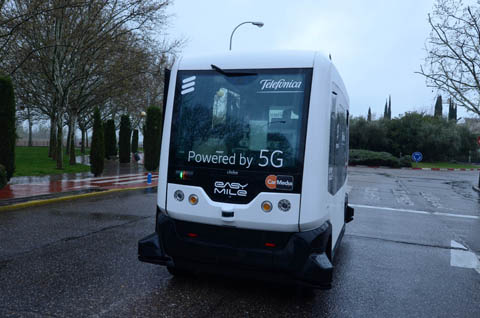On board an autonomous minibus and in collaboration with Ericsson, CarMedia, and EasyMile
- This is the first 5G demonstration to make use of the 3.5 GHz band in an open space and in mobility in Talavera de la Reina.
- The initiative represents one more step in Telefónica’s 5G Technological Cities project in order to transform Talavera de la Reina and Segovia into living 5G laboratories.
Talavera de la Reina, 10 April 2018.- Telefónica presented today in Talavera de la Reina the first 5G use case with an EZ10 autonomous driving electric minibus, representing a first milestone in the 5G Technological Cities project presented by the operator last January.
This is the first 5G demonstration that makes use of the 3.5 GHz band in mobility and consists of an autonomous electric vehicle from the EasyMile company, in which an Ericsson 5G terminal and the CarMedia Solutions platform have been installed, in order to enjoy multimedia content, digital services, and virtual office applications during the journey. 5G coverage is provided through a Telefónica mobile unit where a 5G Ericsson antenna has been deployed.
With this use case, the capabilities of 5G are shown simultaneously with autonomous driving; specifically, the high data transfer capacity and ultra-low latency through the streaming download of high-definition content; the creation of a work environment in the vehicle with virtual office applications and remote driving support based on the real time analysis and processing of the telemetry data sent by the autonomous vehicle.
As indicated by Javier Gutiérrez, Director of Strategy and Network Development at Telefónica Spain, “5G technology has much to contribute in the field of the connected vehicle. In addition to the download of multimedia content, autonomous vehicles generate up to 4TB of daily information from the information collected by the sensors, meaning that a high bandwidth is necessary for transferring this data in real time to the network’s edge and also an extremely low latency. All in order to jointly process the data received by the vehicles of a certain area and to proceed with decision making, thus increasing the security in vehicular environments”.
Jorge Navais, Commercial Director for the Telefonica account, Ericsson, says: “By 2023, 20% of the world’s population will have 5G coverage. It will have an enormous impact in terms of user experience and the digital transformation of industries and cities. Ericsson has already signed 39 agreements to start 5G trials and for the development of use cases like the one we present today. With this demonstration, we take a look at the future and how 5G will enable autonomous driving, only one example among many possibilities. It also poises Ericsson and Telefonica at the forefront of Spain’s journey towards 5G”.
Passengers were able to enjoy Movistar+’s own production contents and Talavera de la Reina’s georeferenced tourism contents thanks to the CarMedia platform. In this way, as the autonomous vehicle advanced through the city, an immersive multimedia experience contextualized with the environment was offered on the screen: where to eat, tourism points of interest, and even where to shop. Finally, the solution integrated digital services aimed at the business world in mobility, such as access to a virtual office by simulating a remote work environment.
This experience makes it possible to anticipate the Fifth Screen concept, designed by CarMedia Solutions. After that of the cinema, TV, the PC, and the smartphone, this screen will certainly have a comparable impact in our lives. Estimates indicate that there will be approximately 10 million autonomous vehicles by 2022, many of them collecting passengers 24 hours a day, and therefore generating a new audience of 200 million hours per day.
The EasyMile electric vehicle is equipped with the most advanced technology in autonomous driving, integrating numerous sensors (LIDAR, GPS, video cameras) that make it possible to analyse the environment and create a three-dimensional map of it. The remote management of the autonomous vehicle is obtained with permanent connectivity, allowing real time access to its internal telemetry data (sensors, extremely precise location, speed, turn rate, etc.), in order to allow actions to be taken at any time.
EasyMile is a pioneering company in autonomous vehicle smart mobility solutions technology that develops software to automate transport platforms without needing dedicated infrastructure. For its part, CarMedia Solutions is a Spanish startup created with the vision that the connected and autonomous car will revolutionize mobility and become this Fifth Screen, a concept designed by CarMedia.
The use case in Talavera de la Reina is part of the 5G Technological Cities project launched by Telefónica last January to transform Talavera de la Reina and Segovia into living 5G laboratories, simultaneously making technological deployments and use cases that make possible to assess the capabilities of 5G.
Present during the 5G demonstration presentation in Talavera de la Reina were Agustina García Élez, Councillor for Development of Castilla La Mancha; Jaime Ramos Torres, Mayor of Talavera de la Reina; Beatriz Herranz Casas, Director of Telefónica’s Large Accounts Centre; Javier Gutiérrez, Director of Strategy and Network Development at Telefónica Spain, and Jorge Navais, director of Ericsson’s Telefónica Spain account.
-
-
-
-
From left to right: Beatriz Herranz Casas, Director of Telefónica’s Large Accounts Centre; Agustina García Élez, Councillor for Development of Castilla La Mancha; Jaime Ramos Torres, Mayor of Talavera de la Reina; Javier Gutiérrez, Director of Strategy and Network Development at Telefónica Spain, and Jorge Navais, director of Ericsson’s Telefónica Spain account.
